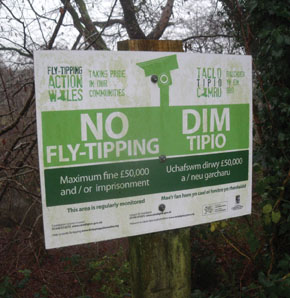As waste costs have steadily risen over recent years, the knock-on effect has been a drastic increase in fly-tipped waste. In a digital age, it has never been easier to raise awareness of fly-tipping incidents, making it easier for the public to see more and more examples. Do you know just how at risk you could be when it comes to fly-tipped waste? In this piece we look at what you can do to prevent yourself from being front page news.
What is Fly-Tipping?
The charity Keep Britain Tidy describe it best and keep it pretty simple, defining it as “illegal deposit of any waste onto land that does not have a licence to accept it”. This means that fly-tipped waste can be anything, from a single mattress to large amounts of construction waste, it all counts if it’s dumped on unlicensed land no matter how much of it there is. It also means that unfortunately that unlicensed land could be yours, which could see you picking up the pieces for somebody else’s wrong doings!
Illegal?
With a new environmental law being released by DEFRA, laws and rules around fly-tipping are quite rightly becoming increasingly strict. In 2016/17, there were over one million incidents of fly-tipping dealt with, costing English councils just over £58 million to clear up.With extreme figures like this being released, it is quite easy to see why the consequences for fly-tipping have increased.
So, is it illegal? Yes, it is a serious criminal offence that could see you picking up a hefty fine of up to £50,000, as well as some cases issuing prison sentences for repeat offenders! These tend to be the more serious cases, although you could still end up being guilty even if it isn’t your waste that has been fly-tipped. You can also be at fault even if you have paid for somebody else to take it away for you, only to find your untrustworthy waste carrier has fly-tipped your waste illegally!
Incidents
The digital age of social media makes it easier for the nation to see numerous examples of fly-tipping happening across the country, plus the fines that come with them. Recent incidents have looked at those totally responsible, and those that have unfortunately been assisted. Here are some examples that show the consequences in different scenarios:
Unlicensed Waste Carrier
When we talk about being found guilty of fly-tipping when somebody else has dumped your waste, the Spalding man is a great example. Unfortunately for this man, he received a fine of just over £1,000, all because the waste carrier who came to collect his waste for him fly-tipped it around the corner and didn’t have a carriers licence. The man admitted that that the waste belonged to him, and that he did not check to see if the carrier had a license. The court decided that corners were cut just to save a couple of pounds, and that the guilty party failed to honour his duty of care when it came to his waste.
Unlicensed
A recent example published in the ITV news, looks at the implications of dumping at an unlicensed location. This incident looks at three men in the Hampshire area, who were fined considerable amounts, as well as being issued prison time. The three men were found guilty of illegally dumping piles of waste at an unlicensed site in Hulbert Road, Hampshire. Part of different waste collection firms, there were all suspended for 12 months, issued 12 weeks of imprisonment each and shared a total of £3500 in fines between them.
Although this may seem extreme, the total pile of waste cost around £100,000 to clear up, so those responsible for dumping the waste only payed just under 5pc of the total clearance cost. All three failed to keep waste transfer notes, or to provide a registered waste carriers licence.
As scary as the punishments sound, there is always help available in order to tackle fly-tipping. Here we look at some top tips on how to effectively report fly-tipping incidents, based on the different scenarios we’ve looked at:
Waste Has Been Fly-Tipped on My Land
First step, don’t panic and report it to Environment Agency. Remember that you still have responsibility, even if it isn’t your waste, as it has been dumped on your land. Fly-tipping is a criminal offence, so it will be treated as a crime investigation which you could help solve and reduce that large yearly clear up figure.
My Waste Is Being Collected by Somebody Else
Like the Spalding man found out, you are still responsible for your waste once it has been collected. You may have found yourself a cheap waste collection company, but the fines involved will cost you a considerably large amount more in the long run. So before booking with that cheaper removal company you have found, ask them for evidence, do they have a waste carriers licence and is the waste going to a licensed dumping ground? Every waste company has an obligation to demonstrate where your waste has ended up. If they can’t evidence this then we’d suggest you don’t use them.
I’m Clearing The Waste Myself
You might want to take a more hands on approach and clear the waste yourself, which is great, but you still need to be careful. When taking this approach, you need to be sure that you are taking your waste to a licensed dumping ground, or you could be in the same boat as the three men in Hampshire. Similarly, in some instances, you need to be sure that you have a waste carriers’ licence, something that shows you are able to legally transport waste from one location to another.
Stop
After a better understanding about fly-tipping and our responsibilities with it, we should hopefully be seeing improvements and a reduced amount these incidents each year.
Photo by Mark Rowe; sign in English and Welsh warning of the penalties for fly-tipping, near Aberystwyth.










